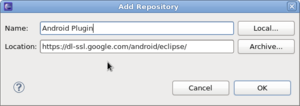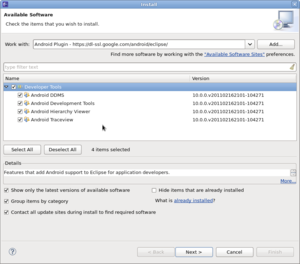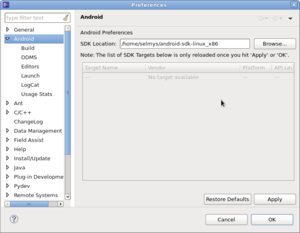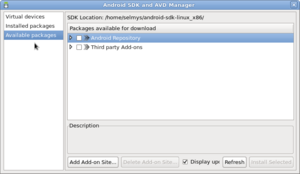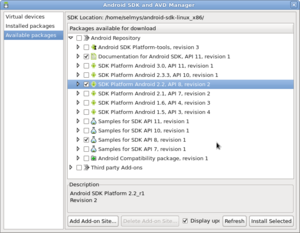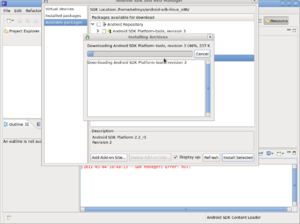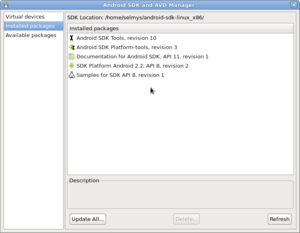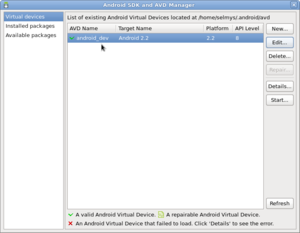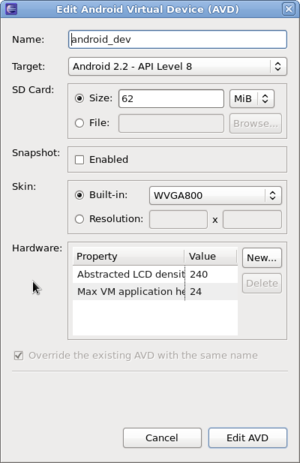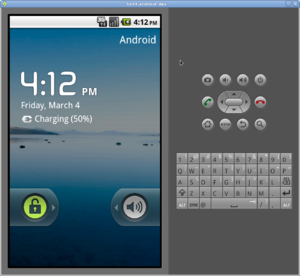Difference between revisions of "Android : Install Eclipse Plugins Fedora"
(→Installing the Android Eclipse Plugin) |
(→Installing the Android SDK) |
||
| (15 intermediate revisions by the same user not shown) | |||
| Line 10: | Line 10: | ||
# That's it! You can now use Eclipse to build C, C++ or Java programs. | # That's it! You can now use Eclipse to build C, C++ or Java programs. | ||
== Installing the Android Eclipse Plugin == | == Installing the Android Eclipse Plugin == | ||
| − | + | <ol> | |
| − | + | <li> From the Eclipse Help menu select Install New Software | |
| − | + | <li> Click on Available Software Sites and check the box next to download.eclipse.org/releases/helios then click Ok | |
| − | [[Image:android-1.png| | + | <li> Back in the Available Software window click on the Add button and add the Android repository https://dl-ssl.google.com/android/eclipse/ |
| − | + | [[Image:android-1.png|right|thumb]]<br style="clear:right;" /> | |
| − | [[Image:android-2.png| | + | <li> Check the box for Developer Tools |
| − | + | [[Image:android-2.png|right|thumb]]<br style="clear:right;" /> | |
| + | <li>Once you review what will be downloaded, you'll need to check the box next to Accept the License then click Finish. Downloading of the plugin should start. | ||
| + | <li>When the download completes you'll need to restart Eclipse. | ||
| + | </ol> | ||
| + | == Installing the Android SDK == | ||
| + | <ol> | ||
| + | <li>You may need to install some 32 bit libraries if you're using 64 bit Fedora as I am. | ||
| + | <pre> | ||
| + | yum install glibc.i686 glibc-devel.i686 libstdc++.i686 zlib-devel.i686\ | ||
| + | ncurses-devel.i686 libX11-devel.i686 libXrender.i686 libXrandr.i686 | ||
| + | </pre> | ||
| + | <li> Download the SDK from http://developer.android.com/sdk/index.html | ||
| + | <li> I downloaded the file android-sdk_r10-linux_x86.tgz | ||
| + | <li> Unarchive the file using "tar xvzf android-sdk_r10-linux_x86.tgz" | ||
| + | <li> You now have a directory named android-sdk-linux_x86/ | ||
| + | <li> Start Eclipse and from the Window menu select Preferences | ||
| + | <li> Select Android and enter the location of your SDK and click Ok | ||
| + | [[Image:android-3.png|right|thumb]]<br style="clear:right;" /> | ||
| + | <li>From the Window menu select Android ADK and AVD Manager. Then select Available Packages. | ||
| + | [[Image:android-4.png|right|thumb]]<br style="clear:right;" /> | ||
| + | <li>Check the packaged you want to install. I selected | ||
| + | <ul> | ||
| + | <li>Documentation for Android SDK, API 11, revision 1 | ||
| + | <li>SDK Platform Android 2.2, API 8, revision 2 | ||
| + | <li>Samples for SDK API 8, revision 1 | ||
| + | </ul> | ||
| + | [[Image:android-5.png|right|thumb]]<br style="clear:right;" /> | ||
| + | <li>Click Install Selected and the download will begin. | ||
| + | [[Image:android-6.png|right|thumb]]<br style="clear:right;" /> | ||
| + | <li>When the downloads complete, check the Installed Packages | ||
| + | [[Image:android-7.png|right|thumb]]<br style="clear:right;" /> | ||
| + | <li>Now select Virtual Devices. You should see one Android device configured. | ||
| + | [[Image:android-8.png|right|thumb]]<br style="clear:right;" /> | ||
| + | <li>Click the Edit button to verify the setup. | ||
| + | [[Image:android-9.png|right|thumb]]<br style="clear:right;" /> | ||
| + | <li>You can then click on the Start button to see your Android phone in action | ||
| + | [[Image:android-10.png|right|thumb]]<br style="clear:right;" /> | ||
| + | <li>Congratulations, you're now ready to develop Android applications for the 2.2 platform. | ||
| + | </ol> | ||
Latest revision as of 11:16, 4 March 2011
Contents
Installing Android Development Tools on Fedora x86_64
For Android developent on Fedora you'll need the following:
- Eclipse
- Android Eclipse Plugin
- Android Software Development Kit
Installing Eclipse onto Fedora 14 - X86_64
- Start with a clean install of Fedora 14, preferably from a live CD. For my examples I used the 64 bit edition.
- When the install is complete, open a terminal window and run yum update to bring your system up to date. You may have to reboot once this is done.
- Install Eclipse (Helios 3.6.1) with the command yum groupinstall "Fedora Eclipse".
- That's it! You can now use Eclipse to build C, C++ or Java programs.
Installing the Android Eclipse Plugin
- From the Eclipse Help menu select Install New Software
- Click on Available Software Sites and check the box next to download.eclipse.org/releases/helios then click Ok
- Back in the Available Software window click on the Add button and add the Android repository https://dl-ssl.google.com/android/eclipse/
- Check the box for Developer Tools
- Once you review what will be downloaded, you'll need to check the box next to Accept the License then click Finish. Downloading of the plugin should start.
- When the download completes you'll need to restart Eclipse.
Installing the Android SDK
- You may need to install some 32 bit libraries if you're using 64 bit Fedora as I am.
yum install glibc.i686 glibc-devel.i686 libstdc++.i686 zlib-devel.i686\ ncurses-devel.i686 libX11-devel.i686 libXrender.i686 libXrandr.i686
- Download the SDK from http://developer.android.com/sdk/index.html
- I downloaded the file android-sdk_r10-linux_x86.tgz
- Unarchive the file using "tar xvzf android-sdk_r10-linux_x86.tgz"
- You now have a directory named android-sdk-linux_x86/
- Start Eclipse and from the Window menu select Preferences
- Select Android and enter the location of your SDK and click Ok
- From the Window menu select Android ADK and AVD Manager. Then select Available Packages.
- Check the packaged you want to install. I selected
- Documentation for Android SDK, API 11, revision 1
- SDK Platform Android 2.2, API 8, revision 2
- Samples for SDK API 8, revision 1
- Click Install Selected and the download will begin.
- When the downloads complete, check the Installed Packages
- Now select Virtual Devices. You should see one Android device configured.
- Click the Edit button to verify the setup.
- You can then click on the Start button to see your Android phone in action
- Congratulations, you're now ready to develop Android applications for the 2.2 platform.
